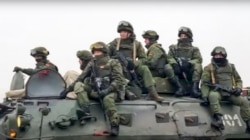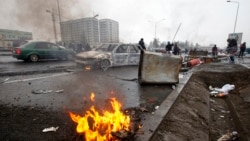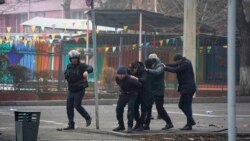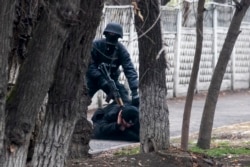More Russian troops arrived Saturday at Kazakhstan’s Almaty International Airport, according to video released by Russia’s defense ministry, on the heels of President Kassym-Jomart Tokayev’s order Friday directing security forces to shoot to kill protesters in the Central Asian nation.
"Terrorists continue to damage state and private property and use weapons against civilians,” the president said, giving the order in a televised national address. “I have given the order to law enforcement to shoot to kill without warning."
In a week of unrest, Kazakh security forces have killed 26 demonstrators and arrested more than 4,400, the Interior Ministry said Saturday. Eighteen law enforcement officers also died.
Almaty, Kazakhstan’s largest city, was mostly quiet on Saturday, according to Agence France-Presse, but security forces were firing warning shots if anyone approached the central square.
Also Saturday, authorities announced the arrest of Karim Massimov, former head of the National Security Committee, on suspicion of high treason. Masimov, 56, led the committee, which is responsible for counterintelligence, until Tokayev removed him earlier this week.
The mostly Russian troops began arriving in Kazakhstan after Tokayev declared a state of emergency Wednesday and appealed to the Collective Security Treaty Organization (CSTO), a Eurasian intergovernmental military alliance, for help quelling the protests. About 2,500 troops are being deployed, some guarding government buildings in the capital, Nur-Sultan, freeing up “part of the forces of Kazakhstani law enforcement agencies [to] redeploy them to Almaty to participate in the counter-terrorist operation,” said a statement from Tokayev's office.
The CSTO is made up of forces from Russia, Belarus, Armenia, Kazakhstan, Kyrgyzstan and Tajikistan.
Tokayev told Russian President Vladimir Putin in a phone call Saturday that “terrorist” attacks are still being carried out in some areas of his country, despite the clampdown, according to a statement on the Kazakh presidential website.
The Kremlin described Saturday’s conversation as lengthy, during which Tokayev described to Putin the unrest, “noting that it is developing towards stabilization.”
Tokayev dismissed international calls Friday for his government to negotiate with the protesters. He continues to claim, without evidence, they are trained and organized by unnamed foreign entities.
He called the protesters bandits and terrorists who must be destroyed and promised this would be done shortly. He also thanked Putin for promptly sending troops, at Tokayev’s request, to help crack down on the protests.
“The presidents exchanged views on the measures taken to restore order in Kazakhstan” and agreed to remain in “constant” contact, the Kremlin statement said.
Protests broke out in Kazakhstan late last week over fuel prices and escalated into widespread violence.
The U.S. State Department on Friday approved the “voluntary departure” of nonemergency U.S. government employees and their families from the U.S. consulate in Almaty and warned that the situation in Kazakhstan could affect the U.S. Embassy’s ability to provide assistance to U.S. citizens departing the Central Asian nation.
U.S. Secretary of State Antony Blinken said the United States was "very concerned" about the state of emergency in Kazakhstan.
"We're watching the situation with real concern, and we are encouraging everyone to find a peaceful resolution," he said.
NATO Secretary-General Jens Stoltenberg also called Friday for an end to the violence in Kazakhstan.
Chinese President Xi Jinping praised Tokayev on Friday for having “decisively taken strong measures at critical moments and quickly calming down the situation,” and referred to the violence by protesters as a “large-scale riot.”
China has invested heavily in Kazakhstan, which is a crucial part of Beijing’s Belt and Road initiative project connecting China to Europe.
Feng Chongyi, an associate professor in China Studies at Sydney’s University of Technology, told VOA’s Mandarin service that China is “very worried about spillover effects” from the Kazakhstan violence, which could encourage citizens in Kazakhstan’s neighbors, or even Chinese citizens, to rise up against their government.
He also noted that while China and Russia often work together on the international stage against the United States, they also have their own conflicts with each other, which he said could flare up over the violence in Kazakhstan. He said if Kazakhstan moves closer to Russia as a result of the current situation this would pose a threat to China’s interests.
Some information for this report came from The Associated Press, Reuters, and Agence France-Presse. VOA’s Mandarin Service, Ricardo Marquina contributed to this report.









